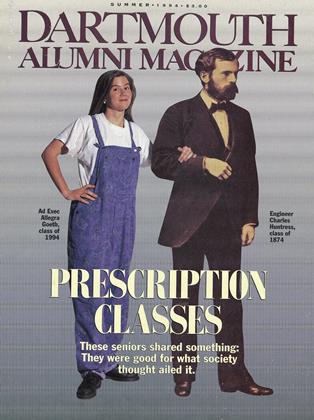"Life, like liberal education, continues to speak to us— if we have the stillness and the courage to listen."
IT IS A VERY GREAT pleasure to congratulate each of you, the members of the class of 1994, on this extraordinarily happy occasion. You and I have experienced together four stimulating years at Dartmouth. Now, after what seems like but the blink of an eye, it is time for you to graduate.
You step into the world fortified with the benefits that a liberal education provides. But what is the value of those benefits? The question brings to mind Benjamin Franklin's famous remark when he was asked, as the Constitutional Convention came to a close, what was the use of the new document. "What is the use," he responded, "of a new-born child?"
The value of a liberal education, like that of a new-born child, depends, of course, on how it is nurtured. Its value depends on how it is made to shape, refine, and deepen our sense of self and others. If we let liberal education make a difference in our lives, it will.
This lesson was reinforced for me two months ago, when I learned that I had cancer. I suddenly came face-to-faceas I know that some members of this audience have, as well—with fundamental questions of value and meaning. The shock of that medical diagnosis brought home to me the meaning of F. Scott Fitzgerald's observation that "in a real dark night of the soul it is always three o'clock in the morning."
In my lonely hours of introspection, I came to concede for the first time the certainty of my own mortality and to understand the vulnerability of my being. I came to appreciate more fully that the time allotted to each of us is limited and precious, and that how we use it matters. I knew these things before, of course—intellectually, even emotionally—but never with all my being.
I have been struck by two realizations—first, that life is a learning process for which there is no wholly adequate preparation; second, that although liberal education isn't perfect, it is the best preparation there is for life and its exigencies. It does enable us better to make sense of the events that either break over us, like a wave, or quietly envelope us before we know it, like a drifting fog.
During the difficult and dismaying days of the last two months, liberal education has helped me in that most human of desires—the yearning to make order and sense out of my experience. I have come to understand, for example, that literary modes—romantic, tragic, comic, satiric—are not mere academic constructs to which plays or novels may conform. Rather, those narrative categories exist because, as the Greeks and others have understood for millennia, life tends to play itself out in ways that seem romantic, tragic, comic, or satiricor perhaps all four.
Hearing a physician say the dread word "cancer" has an uncanny ability to concentrate the mind. That is what liberal education does, too. God willing, this disease and my liberal education will each, in its own way, prove to me a blessing.
What, then, is the use of a liberal education? When the ground seems to shake and shift beneath us, liberal education provides perspective, enabling us to see life steadily and see it whole. It has taken an illness to remind me, in my middle age, of that lesson. But that is just another way of saying that life, like liberal education, continues to speak to us—if we have the stillness and the courage to listen. That reminder is worth more than gold.
In the years ahead, I hope that each of you will nurture the new-born child that is your liberal education. I wish you every happiness and satisfaction. May your affection for "Dartmouth undying" be with you always. Congratulations and good luck!
This was the full text of PresidentFreedman's address to graduates atDartmouth's 224th Commencement,June 12, 1994.
 View Full Issue
View Full Issue
More From This Issue
-
 Feature
FeatureThe Onlyness of a Long-Distance Runner
June 1994 By Robert Sullivan '75 -
 Cover Story
Cover StoryWhat To Learn From Logs
June 1994 By David O. Hooke '84 -
 Article
ArticlePrescription Classes
June 1994 By David Sobie '94 and Kai Singer '95 -
 Article
ArticleDr. Wheelock's Journal
June 1994 By "E. Wheelock" -
 Article
ArticleFilling The Power Vacuum
June 1994 By Karen Endicott -
 Class Notes
Class Notes1973
June 1994 By Donna Ferretti Tihalas
James O. Freedman
-
 Feature
FeatureHONEST TO GOD ACCOMMODATION
OCTOBER 1991 By JAMES O. FREEDMAN -
 Article
ArticleThe Idealist a Leader
February 1993 By James O. Freedman -
 Article
ArticleA New Dartmouth Tradition
June 1993 By James O. Freedman -
 Article
ArticleThe Next Beginning
September 1993 By James O. Freedman -
 Article
ArticleObligations of the Educated
September 1995 By James O. Freedman -
 Article
ArticleThe Education Gap
January 1996 By James O. Freedman
Article
-
 Article
ArticleVisitor of the Month
May 1939 -
 Article
ArticleMoore Lectures
February 1944 -
 Article
ArticleThird Century Professorship Established
JULY 1969 -
 Article
ArticleReversing History, '49er Family Treks East
November 1973 -
 Article
ArticleAlumni Award
JUNE 1971 By EDWIN BRADFORD PEASE '25 -
 Article
ArticlePLANS FOR SERVICEMEN
November 1944 By WM. STUART MESSER


